Previewing Maxiotek's MK8115 SSD Controller: Can DRAM-less Drives Make The Cut?
by Billy Tallis on May 9, 2017 8:00 AM ESTSequential Read Performance
The sequential read test requests 128kB blocks and tests queue depths ranging from 1 to 32. The queue depth is doubled every three minutes, for a total test duration of 18 minutes. The test spans the entire drive, and the drive is filled before the test begins. The primary score we report is an average of performances at queue depths 1, 2 and 4, as client usage typically consists mostly of low queue depth operations.
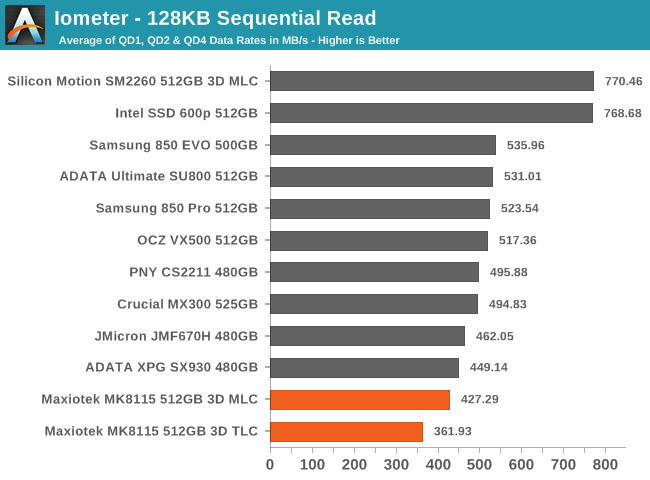
The two MK8115 drives land at the bottom of the performance rankings again for the sequential read test. They aren't really close to saturating the SATA 3 link at low queue depths, but both do at least offer significantly higher throughput than a SATA 2 link could provide, and the fact that the competition is limited by SATA 3 means the MK8115 drives fall behind by a smaller percentage than would otherwise be the case.
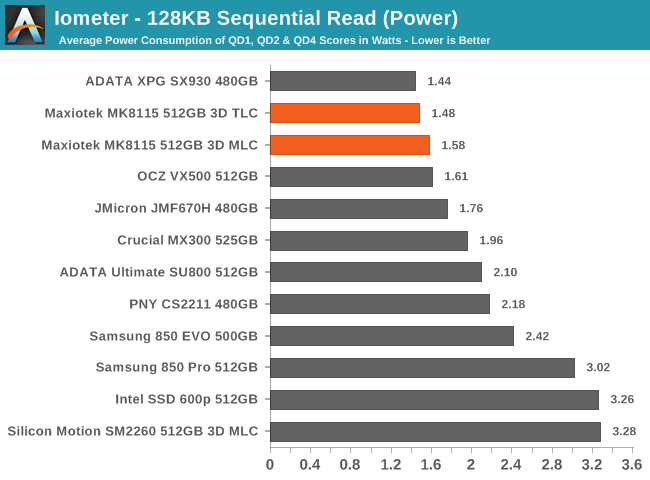
To go with their low performance the MK8115 drives offer almost the lowest power consumption, so the power efficiency is at least reasonable. The ADATA SX930 based on the JMicron JMF670H controller manages to deliver higher throughput with less power, so the lack of a DRAM cache seems to be hurting more than helping efficiency on this test.
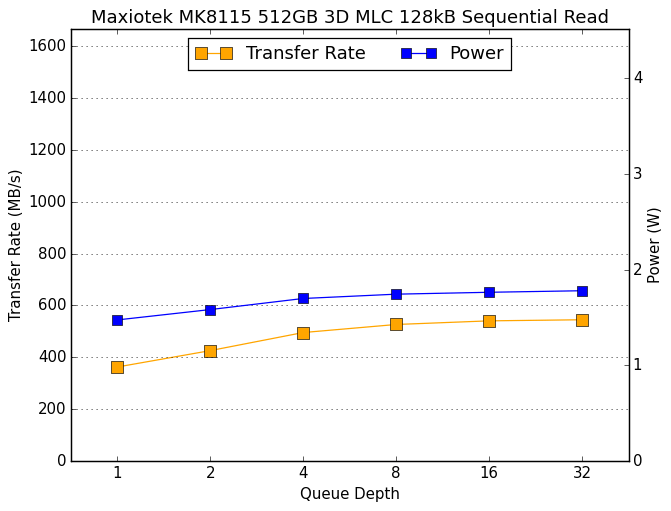 |
|||||||||
Like most SATA drives, the performance scaling as queue depth increases is mostly flat. There's slight performance growth all the up to QD16 while many SATA SSDs are able to offer their full sequential read throughput at QD2.
Sequential Write Performance
The sequential write test writes 128kB blocks and tests queue depths ranging from 1 to 32. The queue depth is doubled every three minutes, for a total test duration of 18 minutes. The test spans the entire drive, and the drive is filled before the test begins. The primary score we report is an average of performances at queue depths 1, 2 and 4, as client usage typically consists mostly of low queue depth operations.
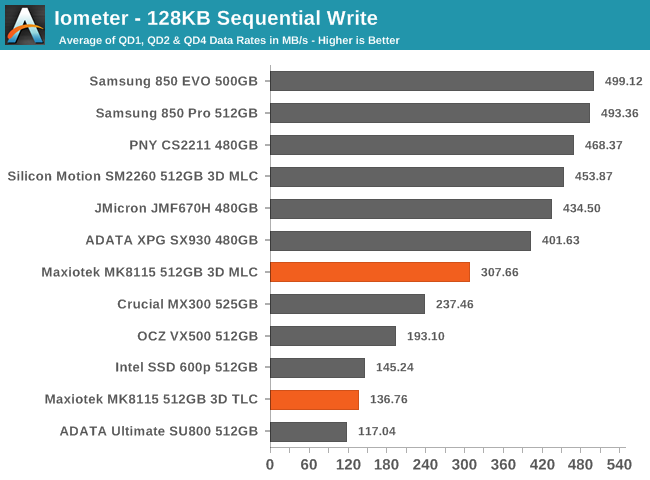
The sequential write test reveals one of the biggest gaps between the MLC and TLC based MK8115 drives. The TLC drive is almost the slowest drive on this test, but the MLC drive is more than twice as fast and outperforms most TLC SSDs while not quite matching typical MLC performance.
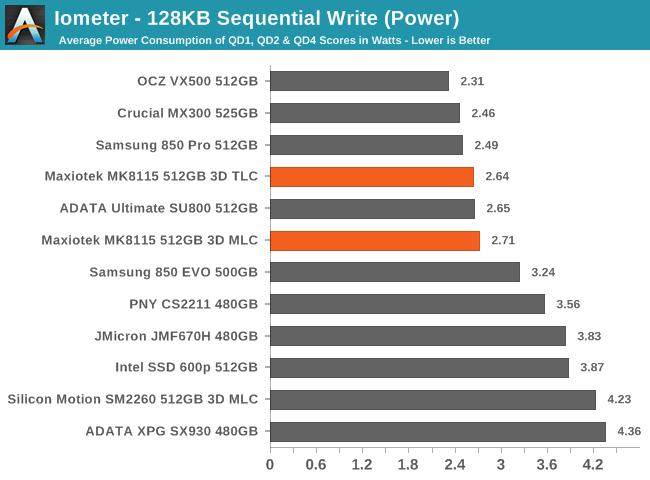
Both MK8115 drives had similar power consumption on the sequential read test, revealing the MLC drive to be far more efficient but still nothing great compared to the competition.
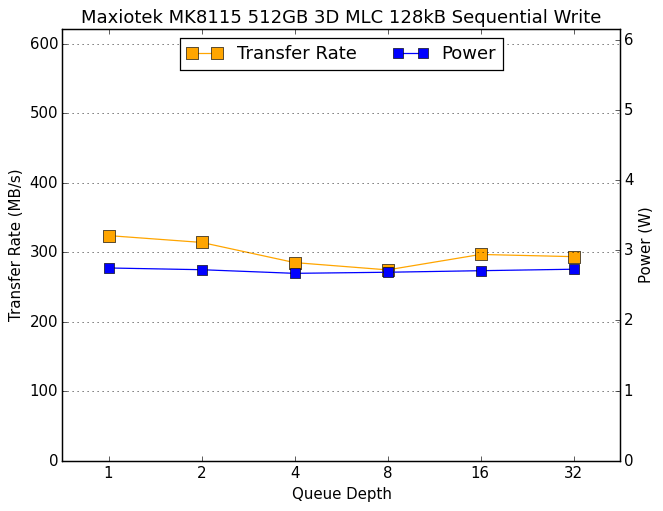 |
|||||||||
The MK8115 drive with MLC experiences a bit of trouble near the middle of the sequential write test, as write speeds drop slightly, but by the end of the test they've mostly recovered and power consumption has been constant across queue depths.










60 Comments
View All Comments
MajGenRelativity - Tuesday, May 9, 2017 - link
samevladx - Tuesday, May 9, 2017 - link
It will take until Q2 2018 for prices to start going down again.milli - Tuesday, May 9, 2017 - link
You should have included other DRAM-less drives.Billy Tallis - Tuesday, May 9, 2017 - link
I would have, if I had any on hand to test. Nobody's offered one up for review in quite a while, and I've asked a few vendors for a Phison S11 drive but they're not interested.vladx - Tuesday, May 9, 2017 - link
It's pretty obvious why, at least Maxiotek has some guts.bortiz - Tuesday, May 9, 2017 - link
My problem with dram-less ssd is the durability of the drive. How does the life-expectancy of this drive compare to other SSD drives. The DRAM in current SSD drives groups data accesses together, reducing the data array access. This increases performance and array durability. Array durability is proportional to the number of array accesses. I don't think this is a good idea and I would like to see if someone can prove to me that this will have a decent life span (5 years???)vladx - Tuesday, May 9, 2017 - link
Whether a SSD IS DRAM-less or not doesn't influence life expectancy.Billy Tallis - Tuesday, May 9, 2017 - link
SSDs that have external DRAM usually don't use it as a write cache for user data; it's just for caching the mapping metadata. A DRAMless controller like MK8115 can do pretty much the same amount of write combining and wear leveling that a mainstream controller can. There may be a slight increase in write amplification from the controller having to flush metadata updates to the flash more often, but mainstream drives don't want to buffer those writes too much either, for the same safety reasons they don't put user data in the DRAM.Remember that write operations are the only ones that significantly affect drive lifetime. DRAMless controllers need to do more flash reads, but read disturb errors are still too rare for that to matter to drive reliability.
CrazyElf - Tuesday, May 9, 2017 - link
It is difficult for it to make the cut with a low 4k random read and write test like this SSD has.I think that the DRAM cache is well worth it.
I think it is best to hold off on SSDs for now.
rocky12345 - Tuesday, May 9, 2017 - link
Yea no thanks if this is what DRAM-less drives are like I think I will stick to SSD's that can maintain their performance a lot better. I don't care if these drives are a bit cheaper if you end up swearing at your computer because the SSD is lagging then for peace of mind just spend the extra cash on a real SSD.I just sold a gaming system to a customer that had a SSD installed as the windows drive. Yep it booted fast and was pretty peppy but if you tried to work the system it seemed like the SSD would bog right down to a crawl so I would assume it was a DRAM-Less SSD. When I sold the customer on the system I was going off of my own SSD usage on my gaming laptop & gaming desktop options which would never bog down like that. I guess the good news was the customer did come back a few days later and said the system was great and so fast that he never had to wait for stuff to load like he did before on his older setup so he was a happy camper I guess.